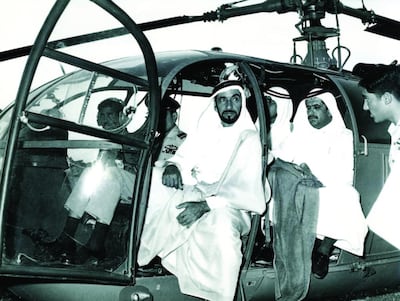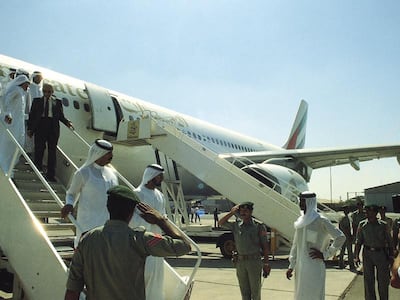This article was originally published in 2020.
Ties between the UAE and Pakistan are warm and historic, stretching back decades.
Pakistan was among the first countries to recognise the UAE follow its foundation in December, 1971.
It has also been said the UAE’s Founding Father, Sheikh Zayed, considered Pakistan, a place he visited many times, his second home.
The warm and deep-seated cooperation has only continued to grow since then and now encompasses the economy, climate change, tourism and culture.
Around 1.6 million Pakistanis call the UAE home sending back billions of dollars in remittances annually.
Pakistani residents - and companies - have over the years played a vital role in helping establish UAE firms.
In 1985, it was Pakistan International Airlines (PIA), the country’s national carrier, that Dubai turned to when founding its new airline, Emirates.
PIA provided technical and administrative assistance to Emirates and leased two aircraft to the new company. In return, the Dubai carrier selected Karachi as the destination for its maiden flight.
The Pakistani military has also played a key role in training and equipping the UAE military and its Air Force. But the relationship’s benefits have extend both ways.
As of 2020, the UAE was Pakistan’s largest trading partner in the region. The UAE exports goods worth around $7.5bn (Dh27bn) to Pakistan annually and imports $869m (Dh3.1bn) worth of goods from the country.
Over the years, the UAE has also invested vast sums in Pakistan’s infrastructure, as well as its education, health, energy, banking, aviation and telecommunication sectors.
In May 2018, the UAE and Pakistan agreed to channel $200m (Dh734m) into the UAE-Pakistan Assistance Programme (UAE-PAP).
The move was ordered by then President Sheikh Khalifa and Sheikh Mohamed bin Zayed, then the Crown Prince of Abu Dhabi and Deputy Supreme Commander of the Armed Forces, to provide humanitarian aid to the country.
The money was used to pay for 40 projects covering roads, health, education, water and agriculture.
The UAE has also made large donations to a campaign aiming to end polio in Pakistan. Sheikh Mohamed has personally donated more than Dh600 million towards the cause.
Since 2014, more than 407m drops of polio vaccine were delivered to around 71m children in Pakistan – one of only two countries in the world, the other being Afghanistan, where polio virus cases still circulate – as part of the UAE-PAP campaign.
Pakistan has honoured the UAE for their aid and assistance, naming numerous facilities such as airports after Sheikh Mohamed.
There is even a Sheikh Zayed Bridge in Pakistan. The Dh38.6m structure, which was built and funded by the UAE, connects 15 towns and 45 villages in Swat Valley.
A model of Al Jahili Fort, which was historically home to the Al Nahyan family, sits at the entrance of the bridge, which opened in 2013.
There is also a Sheikh Zayed Medical Complex in Lahore. The facility was commissioned in 1986 and funded through a donation by Sheikh Mohamed.
Other more recent UAE-funded healthcare facilities include the 100 bed Sheikh Khalifa bin Zayed Al Nahyan Hospital in Swat Valley which opened in 2016.





